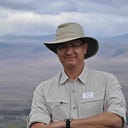TRIBUTE TO A TEACHER & A FRIEND — LAMIN SANNEH
Today, I pay tribute to my teacher and friend, the late Professor Lamin Sanneh. He was a professor of history and World Christianity at Yale. Born into a Muslim family in Gambia, he earned his PhD in Islamic history at the University of London’s famed School of Oriental and African Studies (SOAS).
His 1989 book, “Translating the Message”, was a seminal work that challenged the history of mission and gave many of us first hand accounts of a major thinker who grew up a Muslim and converted to Christianity but retained a deep love for Muslims, a respect for Islamic cultures and an awareness of the complex relationship between the two Abrahamic faiths.
He taught at Yale for 30 years, after teaching at Harvard and Aberdeen universities. In his classes, he was aware that here was this African who studied in Europe and now teaching at an elite school where few of us knew what life is truly like in Islamic Africa.
Sanneh was my strongest influence to visit Africa in order to learn first hand, boots on the ground. Not the great safaris of East and Southern Africa, but the less prosperous West and Northern Africa. It was the many times when we tangled after class over the essence of Christianity that prompted me to rethink all I thought I knew about Islam.
You see, I was born in Islamic majority Malaysia. Like Sanneh, My country was part of the British Empire, so the English language and all things British came into my life early on. Like him, I attended a Catholic mission school, La Salle Petaling Jaya. Like him, I was faced with the issues of Islam and Christianity first-hand, growing up in a Methodist family in Kuala Lumpur where as a 17 year old, I volunteered to be part of an outreach group that eventually grew to be a church, Balai Baptis Damansara Utama. Both of us ended up in London where we had our faith and intellect tested and groomed. Our conversations often dwelled on those formative years for each of us, the celebration of success and the pull to return home.
I was introduced to Sanneh by another historian, Professor Andrew Walls, at Princeton. After a class on the history of Persian missions in Tang Dynasty China (I am ethnically Chinese, hence the obvious interest), Walls mentioned Sanneh as a good contact since I was born in a Muslim majority country. It was this single mention of Sanneh that got me to seek a scholarship at Yale and a year later, I was in his class.
We kept in touch mostly by email as I traveled extensively to many African countries in my quest to understand that amazing continent of many cultures. From Egypt to Morocco, the Sudan, Ethiopia, down almost all of West Africa onto Namibia and South Africa. Then Zimbabwe, Zambia, Tanzania and Madagascar, accepting invitations to speak and participate in conferences along the way. I learned much more than I gave.
I adopted his love of Islamic history and respect for the religion not my own. I owe a great debt to him for helping me to see beyond the easy rhetoric following the 9/11 devastation which I witnessed first-hand here in New York City. We discussed the implications of such a public event and the ramifications for all sides. When I was in West Africa learning about voudon, he jokingly asked if I had converted? To this day, I continue to investigate the Islamic histories of different regions and caliphates, from Russia’s Kazan to the Delhi Sultanates to China’s East Turkestan and the Five Stans of the former USSR.
Always the gentle soul, as you can hear for yourself on any of his YouTube lectures and interviews, Lamin taught me the importance of a historian’s duty to suspend final judgment in order to investigate the past with moral courage and spiritual integrity.
Here are a couple of interviews on YouTube:
We did not agree on everything but he welcomed my probing questions on some of his theses. Once or twice in class, we traded gentle barbs of disagreement, he as an eminent classroom teacher of note and me as an anonymous independent field researcher. He felt I should join the ranks of the company of scholars in order to optimize the institutional facilities open to faculty members but I argued for complete academic freedom to investigate on an interdisciplinary level with no political obstruction from institutions, no matter how prestigious. We agreed to disagree.
His sudden death on January 6, 2019 from a stroke came as a terrible shock to me. I was on my way to yet another African country, Ethiopia. I grieve this loss deeply because he died relatively young, at 76. I knew he had so much more to give the world. This brought to me a piece of advice that another mentor gave to me, the late Professor Samuel Moffett of Princeton, a historian of missions in Asia and the Silk Road, who at 88, regretted that he waited too long to write, and urged me to get on with it. That was 15 years ago. I need to heed this advice.
Unable to attend Sanneh’s funeral and memorial, I now offer this post as my final tribute to yet another mentor whom I was privileged to learn under.
